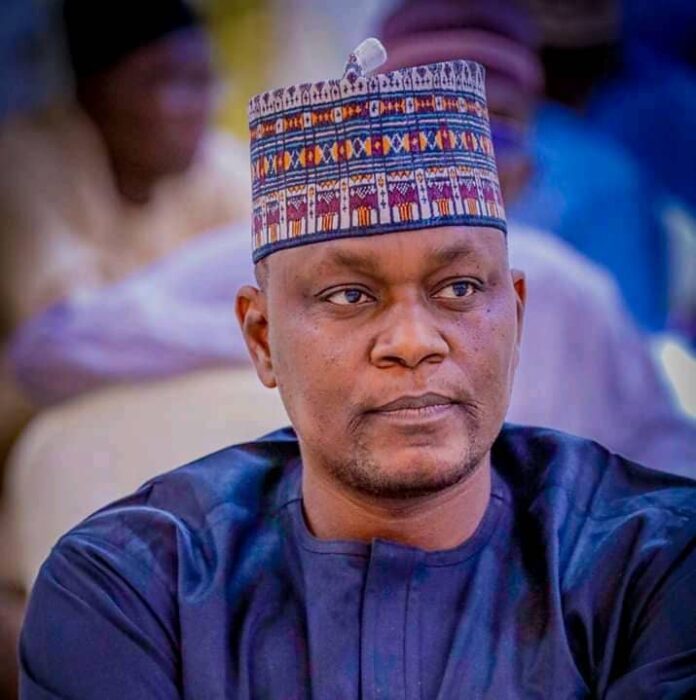Vacuum of Trust: NEDC and Ngazargamu Emirate at Odds Over Exclusion Claims, by Engr. Aliyu Mu’azu Geidam
A rift has emerged between the Northeast Development Commission (NEDC) and youth groups from the Ngazargamu Emirate, following allegations of exclusion from a recent empowerment programme in Yobe State. The controversy has not only sparked a public outcry but also raised questions about fairness in the implementation of development initiatives in insurgency-affected areas.
The Petition That Sparked the Outcry
On October 22, 2024, a group under the banner Ngazargamu Youth Mobilization for Social Change submitted a petition titled “Grave Concern Over the Exclusion of Ngazargamu Constituency in the Recent Empowerment and Training of Youth in Yobe State” to the Managing Director of the NEDC at its Maiduguri headquarters.
The petition followed the NEDC’s empowerment initiative on October 18, 2024, which distributed training kits and starter packs to 558 beneficiaries in Yobe State. Youth from the Ngazargamu Constituency, which includes the insurgency-hit local governments of Geidam, Bursari, and Yunusari, alleged they were largely excluded from the scheme. According to their findings, fewer than ten beneficiaries were selected from the Emirate despite its significant need for recovery and support.
Social Media as a Platform for Advocacy
The youth group took their grievances to social media platforms, particularly Facebook, calling for justice and transparency. Their posts highlighted the perceived marginalisation of the Ngazargamu Constituency, demanding equitable treatment and immediate intervention from local representatives.
Appeal to the State Assembly
On November 1, 2024, the group escalated their concerns by submitting another letter of grievance to the Yobe State Speaker, seeking intervention from the State House of Assembly. They urged the Assembly to investigate the matter and ensure that their constituency received its fair share of opportunities.
Citing Sections 90 and 128 of the 1999 Constitution of Nigeria (as amended), the youth emphasised the Assembly’s authority to legislate for peace, order, and good governance, as well as its power to investigate state affairs and ensure accountability.
Summoning the NEDC
On November 26, 2024, the Yobe State House of Assembly, represented by Hon. Bukar Mustapha (Geidam North), Hon. Mohammed Ali (Geidam South), Hon. Ahmed Musa Dumbol (Yunusari), and Hon. Zannah Baba Danani (Bursari), summoned the NEDC leadership to explain the programme’s selection process.
The NEDC Yobe State Coordinator, Assoc. Prof. Ali Ibrahim Abbas, appeared before the Assembly alongside some beneficiaries from the Ngazargamu Constituency. During the session, certificates of participation and indigene letters were presented as evidence of inclusion. Prof. Abbas further detailed the commission’s selection criteria and its activities aimed at fostering development in the region.
Youth Demand Comprehensive Transparency
Despite these explanations, the Ngazargamu Youth Mobilization for Social Change reiterated their demand for the NEDC to release a comprehensive list of 96 beneficiaries from the Ngazargamu Constituency. They argued that their Emirate, as one of the most insurgency-affected areas in Yobe State, deserved either special consideration or at least equal treatment compared to other local governments.
The NEDC’s Role and the Allegations of Neglect
The NEDC was established to rehabilitate and revitalise insurgency-affected areas across northeastern Nigeria. Its mission includes empowering vulnerable communities to rebuild their lives and achieve sustainable development. However, the perceived exclusion of the Ngazargamu Constituency has led to criticisms that the commission is failing to fulfil its mandate in equitable ways.
The youth stressed that their Emirate, which bears the scars of years of insurgency, should be prioritised in development schemes. “If the NEDC cannot treat us as a special case, given our immense suffering, they should at least treat us equally with other local governments,” they stated.
The situation in Ngazargamu highlights broader concerns about fairness, transparency, and accountability in the allocation of government resources. For the youth, this is not merely a case of resource distribution but a fight for recognition and justice in rebuilding their war-torn communities.
As the NEDC faces mounting pressure to address these grievances, the question remains: will the commission take decisive steps to rebuild trust and ensure equity, or will the voices of Ngazargamu continue to go unheard?
This unfolding issue serves as a stark reminder that in the quest for recovery, no community should be left behind.
Follow the Neptune Prime channel on WhatsApp: https://whatsapp.com/channel/0029Va74ZvU2v1IqKByXoX3d
Do you have breaking news, interview request, opinion, suggestion, or want your event covered? Email us at neptuneprime2233@gmail.com


